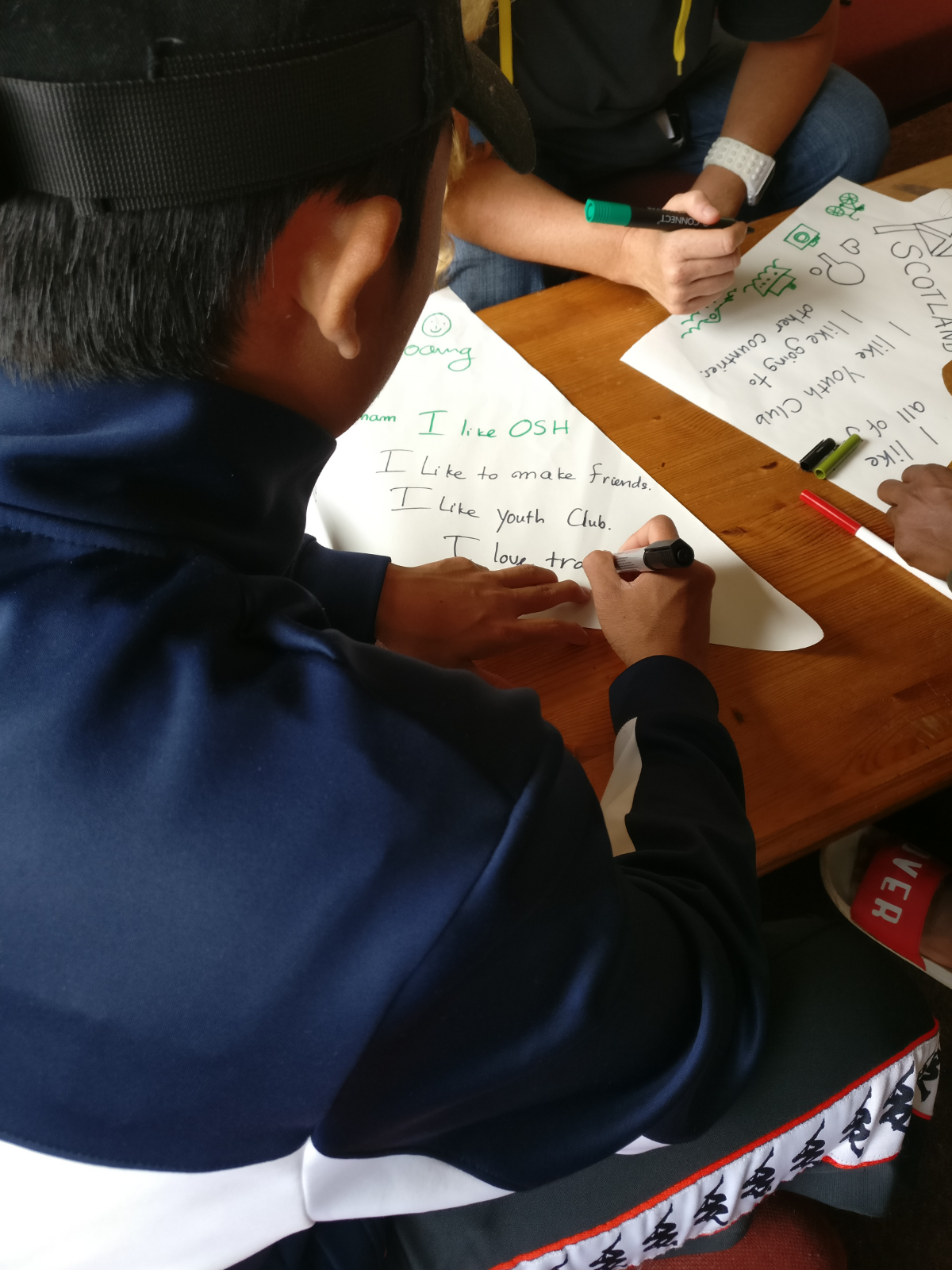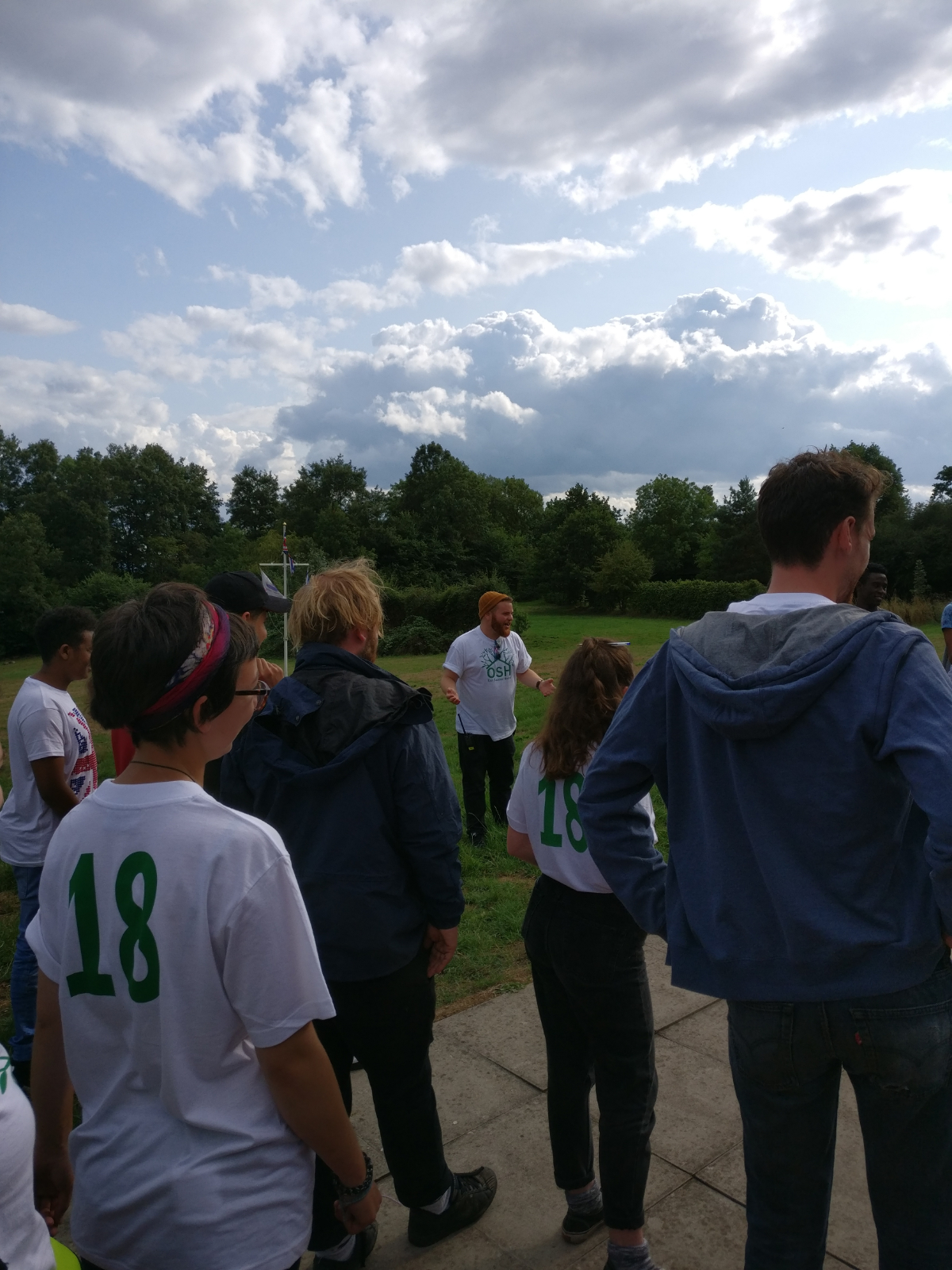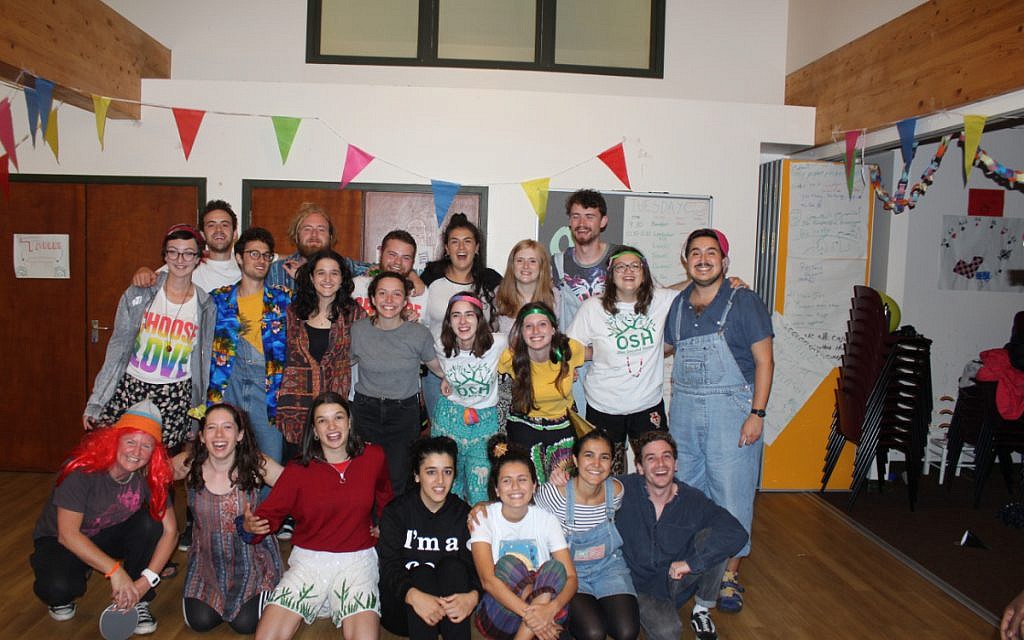A Jewish helping hand for young refugees on summer camp
Rivkah Brown meets a group of teenagers from war-torn countries that came together in rural England for a week of workshops, sport, learning and fun
“BANANA!” In a field in not-so-rural England, a pair of harried twentysomethings is shepherding a group of teenagers through a game of Fruit Salad. It’s one of the many rituals—from death-defying hikes to neverending “wide games” and ear-bleeding renditions of ‘Wonderwall’—reenacted by the thousands of young Jews during their annual summer camp pilgrimage. The thing is, this isn’t Jewish summer camp—though you’d be forgiven for thinking it was.
Two weeks ago, Our Second Home (OSH) welcomed its first set of happy campers to Borehamwood for five days of workshops, sports and the occasional Fruit Salad. The two dozen 14-18-year-olds hailed from almost as many countries—among them Somalia, Sudan, Afghanistan, Eritrea, Ethiopia, Albania, Egypt and Vietnam—and had been in the UK—in sheltered accommodation, foster care and with relatives—for between a few months and several years. They had only two things in common. First was that all, given the nature of coming to the UK unaccompanied, were boys. Secondly, all were refugees.
The UN Refugee Agency recently reported that over half the world’s 25 million refugees are under 18. So far, and for good reason, the global response has been to refugees’ basic needs: legal aid, education, housing. But about a year ago, OSH’s founder Amos Schonfield found himself wondering, “What’s that next step? How can we help them not just survive in their new environment, but thrive?” Hence, OSH was born. Schonfield concedes that the idea of a summer camp for refugees isn’t exactly original. It’s what Jewish summer camps originally were: “a stable base for people in flux”, a place to be Jewish together, a home from home. Now, the former Noam Mazkir wants to recreate this second home for Britain’s newest arrivals. “When people talk about this being the biggest refugee crisis since World War II, that’s coded language for you and me,” says Schonfield. “It’s incumbent upon us as British Jews to use our refugee experience to alleviate others’”. It’s no coincidence, he says, that Help Refugees, The Bike Project and Safe Passage each have “a large dollop of Jewishness”; OSH gets its own from Masorti Judaism, which helped launch the project. But Schonfield’s humanitarianism isn’t just characteristically Jewish. His grandfather was Rabbi Dr Solomon Schonfeld, a man thought to have secured 3,500 European Jews refuge from the Holocaust in Britain. It runs in his blood.
Get The Jewish News Daily Edition by email and never miss our top stories Free Sign Up

I join Schonfield and his volunteer team—a mix of Noamniks, Calaisniks (one of whom, a charming Glaswegian named Chris, two boys will recognise from The Jungle) and a smattering in-between—on pre-camp, where they’re discussing terminology. Just as Jewish youth movements provide “a space in which to mediate between your Britishness and your Jewishness”, Schonfield wants to make participants feel at home—whether by buying a kilo of Ethiopian Berbere spice from a King’s Cross cornershop, or by allowing participants to keep their phones (“the gateway to their whole life”)—while helping them acculturate to life in Britain. The major way OSH is doing the latter is by making English the main language. A minor way is by renaming the site after London landmarks; though this has presented the question of whether “Tower of London”, given its incarceratory connotations, is an appropriate name for a dorm room. The team go for “London Eye” instead. Hiding in plain sight, of course, is the word “camp”.
Yet for all the talk of triggering and trauma, the busload of boys that rolls up the following day is boisterous as any; their arrival heralded by a cacophony of laughter, Arabic, and music blasting from phone speakers. Minutes later, they’re hurling themselves into the ice breakers like a herd of Arctic walruses. Once you’ve led a campful of reluctant Jewish teenagers, such enthusiasm seems miraculous. Then again, this is the most fun many of the boys have had in a while. Take Birhan,* a 17-year-old Ethiopian whose year-long journey to the UK included three months in a Bulgarian prison. Having arrived in February and with college not starting until September, his one friend is his brother, whom he lives with. Between appointments with his solicitor, social worker and the Home Office, the only time he even leaves the house are on his brother’s days off. The last was a couple of weeks ago, when they took a day trip to Brighton. “I missed the sea.”

The camp I return to a couple of days later seems to be running itself. So eager are the boys to pitch in—one stuns Chris with a request for a mop with which to clean the bathroom floor—that some of the leaders say they feel redundant. That’s partly intentional. Over the next few years, Schonfield wants OSH to become—like Jewish youth movements—peer-led. “I can be many things to a young refugee, but I’m not the best role model. You need someone who looks like you, has a similar story to you, embodies your ambitions.” It’s why he recruited Ziya,* a 22-year-old trainee medic who arrived from Iraq on the back of a truck aged two. She’s forgotten the journey but remembers what came after it: weekly trips to food banks, days without permanent housing, hours spent interpreting for her parents to doctors, lawyers, government officials. Now an OSH volunteer, “I’m grateful to be in a position to give back. I want these boys to know they aren’t a burden, that they have potential.” A few are already showing it; like Jamil,* a 16-year-old Somalian who after only a year in the UK has already completed his Duke of Edinburgh Bronze Award, and who takes it upon himself to call the other Muslim campers to prayer. One day, Jamil wants to be a teacher; next year, Schonfield wants him to be a camp leader.
Not everyone on camp is so sure of OSH’s high-minded ambitions, however. Marian Spiers is a Scottish superwoman who divides her time between two refugee charities—South London Refugee Association, and DOST (meaning “friend” in a number of languages, including Hindi, Urdu and Turkish)—and is the main referee of OSH participants. During her 35 years’ work with young people and 9 with refugees, Spiers has seen charitable funding for projects like OSH evaporate just as they’re flooded with demand. 310 boys came through DOST’s youth club in 2017—the most in 9 years—while in the past three the organisation has in shrunk from a team of 10 to a one-woman show. With her two phones ringing off the hook in the days before camp, and during it, rarely seen without an arm around her, Marian is much more than a friend to these boys: “At least 30 of them call me Mum”. Spiers doubts they need the kind of responsibility Schonfield wants to give them: “They’ve already shouldered so much, not least getting themselves to the UK alive. Now they’re here, there’s so much pressure on them—from the government, from their family—to make something of themselves. Why add to that?” That’s even assuming the boys will be around next year. While the Home Office automatically grants children who arrive in the UK unaccompanied leave to remain, they must reapply for asylum once they turn 18. Last year, 82% of these applications were rejected.
Realities like these threaten to burst the camp bubble. At the back of the field, beside a group of boys playing keepy-uppy, I find Yusef,* a 15-year-old Eritrean, with Marian. He’s fallen out with his foster family, and desperately wants her help finding another. Then the ball clips Yusef’s head and the effect is like magic: his brows unfurrow, his shoulders drop, his face melts into a smile. He abandons his conversation to join the game. At least for now, the most powerful thing OSH is doing isn’t preparing these kids to become leaders—it’s allowing them to be kids.
*Names have been changed.
- FULL Jewish News interview with John McDonnell: ‘MPs shouldn’t face deselection’
- Listen to the full interview with John McDonnell here:

Thank you for helping to make Jewish News the leading source of news and opinion for the UK Jewish community. Today we're asking for your invaluable help to continue putting our community first in everything we do.
For as little as £5 a month you can help sustain the vital work we do in celebrating and standing up for Jewish life in Britain.
Jewish News holds our community together and keeps us connected. Like a synagogue, it’s where people turn to feel part of something bigger. It also proudly shows the rest of Britain the vibrancy and rich culture of modern Jewish life.
You can make a quick and easy one-off or monthly contribution of £5, £10, £20 or any other sum you’re comfortable with.
100% of your donation will help us continue celebrating our community, in all its dynamic diversity...
Engaging
Being a community platform means so much more than producing a newspaper and website. One of our proudest roles is media partnering with our invaluable charities to amplify the outstanding work they do to help us all.
Celebrating
There’s no shortage of oys in the world but Jewish News takes every opportunity to celebrate the joys too, through projects like Night of Heroes, 40 Under 40 and other compelling countdowns that make the community kvell with pride.
Pioneering
In the first collaboration between media outlets from different faiths, Jewish News worked with British Muslim TV and Church Times to produce a list of young activists leading the way on interfaith understanding.
Campaigning
Royal Mail issued a stamp honouring Holocaust hero Sir Nicholas Winton after a Jewish News campaign attracted more than 100,000 backers. Jewish Newsalso produces special editions of the paper highlighting pressing issues including mental health and Holocaust remembrance.
Easy access
In an age when news is readily accessible, Jewish News provides high-quality content free online and offline, removing any financial barriers to connecting people.
Voice of our community to wider society
The Jewish News team regularly appears on TV, radio and on the pages of the national press to comment on stories about the Jewish community. Easy access to the paper on the streets of London also means Jewish News provides an invaluable window into the community for the country at large.
We hope you agree all this is worth preserving.
-
By Brigit Grant
-
By Laurent Vaughan - Senior Associate (Bishop & Sewell Solicitors)
-
By Laurent Vaughan - Senior Associate (Bishop & Sewell Solicitors)
-
By Laurent Vaughan - Senior Associate (Bishop & Sewell Solicitors)
-
By Laurent Vaughan - Senior Associate (Bishop & Sewell Solicitors)






















